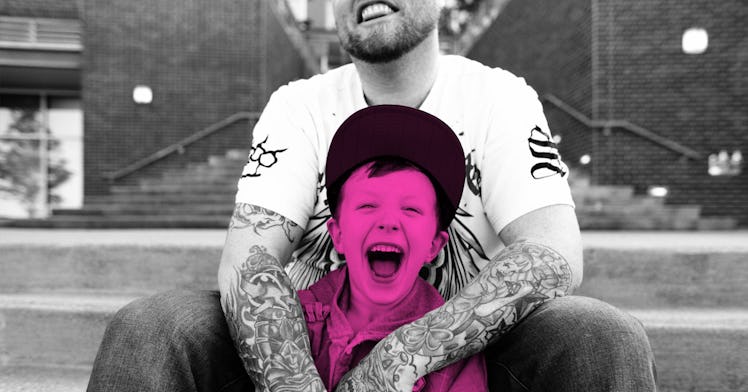The Science of Jokes for Kids: Children Laugh At The Unexpected, Not Funny Punchlines
Psychologists, nuerologists, magicians, and therapists know the secret to a perfect joke for kids, but it may mean making dad the butt of the joke (or talking about butts in general).

Unlike sarcasm or irony, jokes for kids aren’t funny because of subtlety. Thankfully, the quality of laughter is largely unrelated to the sophistication of the joke teller. For children, humble potty humor has no less brain-boosting worth than a clever pun. As long as the end result is laughter, kids will reap the benefits. But what about parents who are worried they can’t tell jokes at all? Happily, there are professionals who know exactly where a kid’s funny bone is located and can help parents get the laugh every time.
Neuroscientist Robert Provine, author of Laughter: A Scientific Investigation has made a career of studying how and why people laugh. In his research, he found some important neurological factors to laughter that might help parents trying to get a kid to laugh. First off, laughter isn’t necessarily about what’s funny. Also, it occurs autonomously and without effort. And finally, it’s a behavior deeply rooted in relationships, which is also why it’s contagious. Often laughter itself is all that’s needed to elicit laughter.
“Laughter is the sound of play — physical and cognitive,” explains Provine. “And can be encouraged by engaging in more play.” But calling laughter the “the sound of play” isn’t just a metaphor. It is the literal evolutionary origin of laughter. The panting of our playful ancestors became the laughter of modern humans. No jokes were necessary.
“Also, since laughter is highly social, occurring 30-times more often in social than solitary settings,” Provine says. “For more laughter in your kid’s life, they must be in the presence of others.”
How to Make a Kid Laugh Every Time
- Laugh First: Laughter is contagious. If your laughing your kid might just start laughing along with you.
- The Jokes on You: Kids love laughing at adults. It’s empowering and surprising. Make yourself the butt of the joke and laughter will follow.
- Add a Twist: The best jokes have an unexpected twist, lean into the surprise.
- Add Poop: Potty humor never fails. Just be prepared for the repercussions.
- Repeat Yourself: If a kid found a joke funny once, they’ll find it funny again, and long after you’ve tired of telling it.
No one knows the reality of social kid laughter better than entertainers. After all, It’s their job to make kids laugh. Jack Bedell-Pearce is a father of two and a professional magician and member of the prestigious Magic Circle. He notes that one of the best ways to make a child laugh is to offer the unexpected, particularly if it’s at the expense of an adult. “Balloons popping, puppets misbehaving, props spontaneously breaking and things generally going missing are hilarious to kids,” he explains.
Bedell-Pearce also notes that kids find it funny to have more information than adults. “Kids are rarely in the position of having more information than adults, so when the roles are reversed not only is it funny, it’s also empowering.”
His experience is very much in line with research about what makes jokes funny. Consider the work of psychologist Richard Wiseman who spent a year looking for the funniest joke in the world through his LaughLab project. Based on his research, Wiseman found that while a person’s taste plays a small factor in whether or not someone finds a joke funny, the most hilarious jokes share a few distinct qualities. According to his final analysis, Wiseman found the best jokes “sometimes make us feel superior to others, reduce the emotional impact of anxiety-provoking situations, or surprise us because of some kind of incongruity.”
A kid-friendly joke from Belgium is exemplary in those factors: Why do ducks have webbed feet? To stamp out fires. Why do elephants have flat feet? To stamp out burning ducks.
The factors of a funny joke may also explain what Licensed Marriage and Family Therapist Katie Ziskindone considers one of the most hilarious subjects a parent can address with a kid. “Children laugh at jokes that have to do with poop,” she says. “Children are fascinated with their bodies and even adolescent will laugh at poop emojis and poop jokes.”
Why is that? For kids, poop jokes hit at least two of the three factors that make a joke funny. For one, they address the anxiety-provoking topic of pooping. Also, poop jokes offer an incongruous surprise in that it’s a private subject being talked about in a public way — with adults. What’s not to laugh about?
Sure, scatological humor is gross and cheap, but again, the social benefit of laughter is not dependent on whether or not the joke will pass muster with people who listen to NPR. “Laughing together directly improves family relationships,” Ziskindone explains. “Laughter can be used to help a child overcome a challenging situation and cheer them up. Laughing together increases bonding, trust, and attachment.”
In other words, it’s a very good thing. And it’s not hard to keep a good thing going, according to Bedell-Pearce. “Remember that a child’s appetite for repetition is not like that of an adult,” he says. Making a kid laugh is one place where variety may not particularly helpful. As long as adults don’t mind repetition, they can get they laugh as often as they’re willing to repeat the joke.
Which means that parents might want to get ready to tell their best poop joke over and over (and over) again. And guess what: After you and your kid have been laughing at that poop joke for long enough, you might actually start to get it.
This article was originally published on